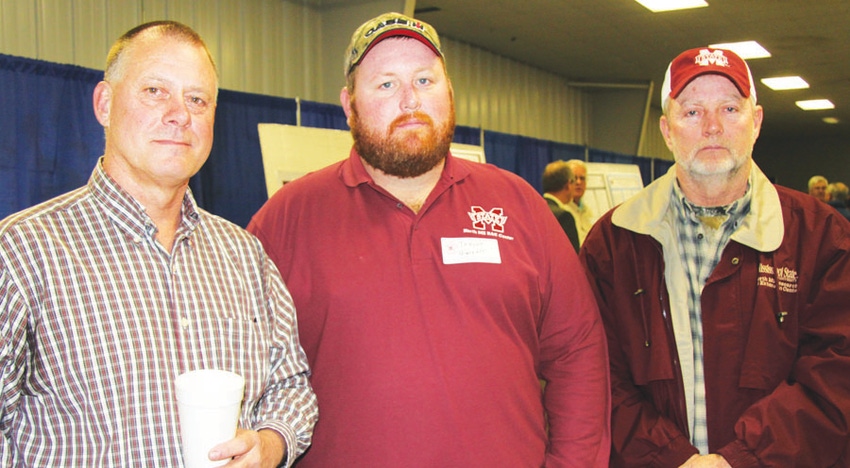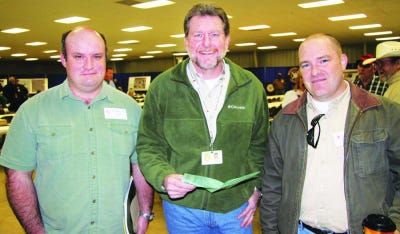
Advisory Council provides insight into needs of Mississippi producers
The North Mississippi Producer Advisory Council meets annually at the Verona Research and Extension Center for row crop, livestock, forestry, and specialty crop producers give Mississippi State University Extension and research personnel insight into what they’d like to see in terms of projects, programs, and services.

More research on fungicides for peanut, corn, and wheat diseases, development of improved grain varieties, and more tools to combat weed resistance — those are among items on the wish lists of north Mississippi producers.

BRADY SELF, from left, Extension Forestry and George Byrd, Mississippi Forestry Commission, both at Grenada, and Jason Gordon, Extension Forestry at Mississippi State University, came to hear landowner recommendations for forestry programs.
The North Mississippi Producer Advisory Council meets annually at the Verona Research and Extension Center for row crop, livestock, forestry, and specialty crop producers give Mississippi State University Extension and research personnel insight into what they’d like to see in terms of projects, programs, and services.
“We hold these meetings all over the state,” says Gary Jackson, director of the MSU Extension Service. “They are very important for Extension as a part of our needs assessment planning. It’s a chance for producers to tell us what we need to be doing in terms of our agriculture, forestry, and veterinary medicine, and what we need to be delivering back to you through Extension.
“We have about 250 field agents across the state who are working in local communities, through local, area, and regional education programs. Our faculty members at the university and at our experiment stations — about 100 of them at the Ph.D. level, many with joint research/Extension/academic responsibility — are charged with producing the research and developing statewide Extension programs for delivery to you. This needs assessment process is very valuable to us.”
Extension leaders and staff “spent a lot of time this past year in strategic planning and staff development that we feel will enable us to better serve Mississippians.We’re making changes in Extension to make it more effective and more accountable to you.
“We appreciate your support of Extension Service, not just what we do in agriculture, forestry, but also in local community development. Our local field agents go beyond just the agriculture area — they also work in 4-H, family, and community development, and this is one of the areas we want to expand.”
Reuben Moore, associate director of the Mississippi Agricultural and Forestry Experiment Station, told producers, “We’re open to the guidance you provide. We can’t accommodate everything, but we’ll try and determine priorities for what we need to address. We want you to take a close look at our research and Extension programs, and give us your valuable input to help us in making future decisions and prioritize our activities.
Among the recommendations made by presenters for the row crop and vegetables sector were:
Vegetables, Ralph Hanskiewicz, Union County — More research needed on control of soil diseases and on pumpkin varieties for farm markets and school tours; assistance in creating farm-to-school cooperatives; and research on sweet corn varieties for north Mississippi.
Sweet potatoes, Danny Clark, Calhoun County — Additional research on varieties and on tip rot, and pest management issues, including nematodes, weeds, and insects; research on added value from non-marketable sweet potatoes — “a lot of potatoes are hauled to landfills each year, and they’re could potentially be worh a lot of money for feed, fuel and other uses.”
Peanuts, Roy Weathers, Lowndes County — Place a high priority on hiring an Extension peanut specialist — “We’ve been without one since last June”; additional research on fungicides and application timing, including a continuation of the fungicide work by Alan Henn, MSU professor of entomology and plant pathology; and direct daily e-mails during the growing season on the peanut disease situation around the state.
Grain crops, Bobby Moody, Lee County — Continue to work with state promotion boards in support of research on improved varieties; research on fungicides for corn and wheat; new product research; and continuation of research on products containing 2,4-D. “It’s also very important that we continue to have adequate funding for the state Department of Environmental Quality — it’s a lot easier to deal with someone in Jackson, Miss., than in Washington.”
Cotton, Joe Camp, Itawamba County — Additional research on management of resistant weeds; closer monitoring of resistant and non-resistant plant bugs; hire a cotton breeder to develop improved varieties for the hill areas of the state to overcome high micronaire and other problems.
About the Author(s)
You May Also Like



